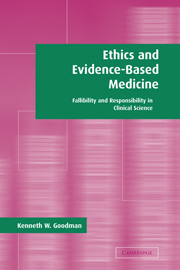Book contents
- Frontmatter
- Contents
- Preface
- Acknowledgments
- 1 Foundations and history of evidence-based practice
- 2 The research synthesis revolution
- 3 Evidence of evidence, and other conceptual challenges
- 4 Human subjects, the Internet, databases, and data mining
- 5 Evidence at the bedside
- 6 Public health policy, Uncertainty, and genetics
- 7 Ethics and evidence
- References
- Index
2 - The research synthesis revolution
Published online by Cambridge University Press: 29 September 2009
- Frontmatter
- Contents
- Preface
- Acknowledgments
- 1 Foundations and history of evidence-based practice
- 2 The research synthesis revolution
- 3 Evidence of evidence, and other conceptual challenges
- 4 Human subjects, the Internet, databases, and data mining
- 5 Evidence at the bedside
- 6 Public health policy, Uncertainty, and genetics
- 7 Ethics and evidence
- References
- Index
Summary
When this common sense of interest is mutually express'd, and is known to both, it produces a suitable resolution and behaviour. And this may properly enough be call'd a convention or agreement betwixt us, tho' without the interposition of a promise; since the actions of each of us have a reference to those of the other, and are perform'd upon the supposition, that something is to be perform'd on the other part. Two men, who pull the oars of a boat, do it by an agreement or convention, tho' they have never given promises to each other.
David Hume (1739: 541—2)A special challenge for evidence-based medicine is what to do with all the evidence – all the often confusing, sometimes contradictory, generally hard-to-understand evidence. As science grows, so grows the need to collate, synthesize, and otherwise make sense of a burgeoning corpus. Our task in this chapter is to continue the discussion begun in Chapter 1 and look at a quarter-century of effort to bring together disparate kinds of empirical data and render them useful in practical decision making. It will include a discussion of the conceptual problems that arise when we gather information about the world and use this information to increase understanding and guide decision making. Indeed, the very idea of evidence in medicine is sometimes taken to be a simple matter of linking up facts for the sake of problem solving.
- Type
- Chapter
- Information
- Ethics and Evidence-Based MedicineFallibility and Responsibility in Clinical Science, pp. 23 - 40Publisher: Cambridge University PressPrint publication year: 2002



